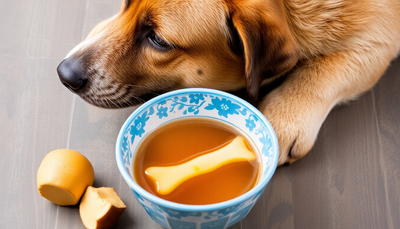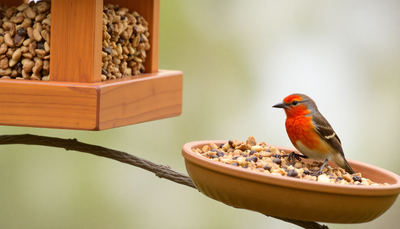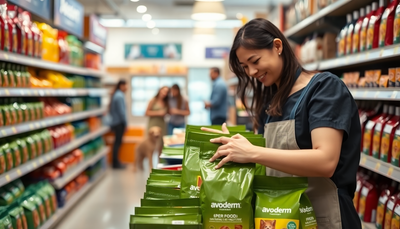When it comes to the well-being of our beloved canine companions, nutrition plays a pivotal role. For dogs with chicken allergies, finding the right diet can be particularly challenging. Chicken is a common ingredient in dog food, and navigating the world of dog nutrition without it requires diligence and knowledge. In this article, we will delve into the intricacies of selecting the best dog food for dogs with chicken allergies, providing comprehensive insights and recommendations.
Understanding Chicken Allergies in Dogs
Understanding the nature and implications of chicken allergies in dogs is crucial for any pet owner. Chicken allergies are more prevalent than many might assume, and they can significantly affect a dog's quality of life.
The Biological Basis of Allergies
First, let's address the question: What exactly is a chicken allergy in dogs? Essentially, an allergy occurs when a dog's immune system overreacts to a particular protein found in chicken. This hypersensitivity can lead to an array of symptoms and can affect dogs at any age. The immune system mistakenly identifies chicken proteins as harmful, triggering a defensive response.
Identifying the Symptoms
Recognizing the signs of a chicken allergy is crucial for any pet owner. Common symptoms include:
- Itchy skin or rashes
- Persistent ear infections
- Gastrointestinal distress, such as vomiting or diarrhea
- Excessive licking or chewing of paws
These symptoms can vary in intensity and frequency, depending on the severity of the allergy. If your dog exhibits any of these symptoms, it's advisable to consult with a veterinarian for an accurate diagnosis and tailored advice. Early detection and intervention can prevent more severe health issues.
The Importance of a Chicken-Free Diet
For dogs allergic to chicken, a chicken-free diet is not just a preference but a necessity. Eliminating chicken from their diet can alleviate symptoms and improve their overall health. This requires careful selection of dog food products that completely avoid chicken and chicken-derived ingredients. The transition to a chicken-free diet should be managed carefully, ensuring that the dog's nutritional needs are still met without compromise.
Selecting the Best Dog Food Without Chicken
Choosing the right dog food involves more than just avoiding chicken. It necessitates understanding the nutritional needs of your dog and ensuring they receive a balanced diet. Here are some factors to consider:
Exploring Alternative Protein Sources
When selecting a dog food for dogs allergic to chicken, consider alternative protein sources such as:
- Lamb: A rich source of protein and essential amino acids, often well-tolerated by dogs with allergies.
- Fish: Offers omega-3 fatty acids, promoting healthy skin and coat, and is highly palatable for most dogs.
- Duck: Known for being gentle on the digestive system, providing a novel protein option for sensitive pets.
- Venison: A lean protein that is often novel to many dogs, reducing the risk of allergies and providing high energy.
- Turkey: Often well-tolerated by dogs with poultry sensitivities, offering a familiar yet distinct protein source.
Achieving Nutritional Balance
Ensure that the chosen dog food provides a well-rounded nutrient profile. Look for products that include:
- High-quality proteins: Vital for muscle maintenance and energy, ensuring your dog remains active and healthy.
- Essential fatty acids: Important for skin and coat health, contributing to a shiny and resilient coat.
- Vitamins and minerals: Necessary for overall wellness and immune support, aiding in disease prevention.
- Digestible carbohydrates: Such as sweet potatoes or peas for energy, providing necessary fuel without allergens.
Evaluating Ingredient Labels
When selecting a dog food, carefully reading and understanding ingredient labels is paramount. Check for any hidden chicken derivatives or by-products that may trigger an allergic reaction. Look for brands that emphasize transparency and quality in their ingredient sourcing and processing methods.
Top Recommendations for Chicken-Free Dog Food
With a myriad of options available, it can be overwhelming to choose the best one. Here are some top-rated, chicken-free dog foods that have garnered positive reviews from pet owners and experts alike:
1. Zignature Limited Ingredient Formula
Zignature offers a range of limited ingredient formulas that exclude chicken entirely. Their products focus on single animal protein sources, making them ideal for dogs with allergies. Available flavors include lamb, duck, and venison, each enriched with essential nutrients. These formulations are designed to minimize the risk of allergic reactions while providing complete nutrition.
2. Wellness Simple Natural Limited Ingredient Diet
Designed for dogs with food sensitivities, Wellness Simple features simple, natural ingredients and avoids common allergens. Their salmon and potato recipe is a favorite, providing omega-3 fatty acids and high-quality protein. This brand emphasizes digestive health and skin wellness, making it a suitable choice for sensitive dogs.
3. Natural Balance L.I.D. Limited Ingredient Diets
Natural Balance is renowned for its commitment to pet health and wellness. Their limited ingredient diets offer a variety of protein sources, such as sweet potato and fish or lamb and brown rice, ensuring no chicken by-products. These products are crafted to support overall health and reduce the incidence of allergies.
4. Canidae PURE Grain-Free
Canidae PURE offers a selection of grain-free recipes that are perfect for dogs with allergies. Their formulas contain fewer than ten key ingredients, focusing on high-quality proteins like bison and lamb to support healthy digestion and overall well-being. This brand prioritizes simplicity and purity, catering to dogs with sensitive stomachs.
Transitioning to a New Diet
Switching your dog's diet requires careful planning to ensure a smooth transition. Follow these steps to minimize digestive upset and encourage acceptance of the new food:
Gradual Introduction
Start by mixing a small amount of the new food with your dog's current diet, gradually increasing the proportion over 7-10 days. This slow transition helps the dog's digestive system adjust to the new ingredients and reduces the risk of gastrointestinal distress.
Monitoring Reactions
Observe your dog for any adverse reactions or changes in behavior, particularly during the initial transition phase. Look for signs of improvement or any new symptoms that may arise, keeping a close eye on their overall health and well-being.
Maintaining Consistency
Once fully transitioned, maintain a consistent feeding schedule to support your dog's digestive health. Consistency helps establish a routine and ensures the dog receives adequate nutrition without fluctuations that might upset their system.
Beyond the Bowl: Holistic Care for Allergic Dogs
While selecting the right dog food is critical, holistic care plays an equally important role in managing allergies. Consider incorporating the following practices:
Regular Veterinary Check-ups
Stay informed about your dog's health and address any emerging issues promptly. Regular check-ups can catch potential problems early and provide valuable insights into your pet's overall health status.
Allergy Testing
Identifies specific allergens and allows for tailored dietary and environmental adjustments. Allergy testing can pinpoint the exact causes of your dog's reactions, enabling more targeted interventions.
Skin and Coat Care
Regular grooming and the use of hypoallergenic shampoos can alleviate skin irritations. Proper skin care is essential for dogs with allergies, as it helps soothe and protect sensitive skin.
Conclusion
Navigating the world of dog food for dogs with chicken allergies may seem daunting, but armed with the right information and resources, you can make informed decisions that prioritize your pet's health and happiness. By selecting high-quality, chicken-free dog food and embracing a holistic approach to care, you can provide your furry friend with the nourishment they need to thrive. As always, consult with your veterinarian to ensure any dietary changes align with your dog's unique needs and health requirements.
Remember, the journey to optimal health begins with the first bite of the right food. Happy feeding!






